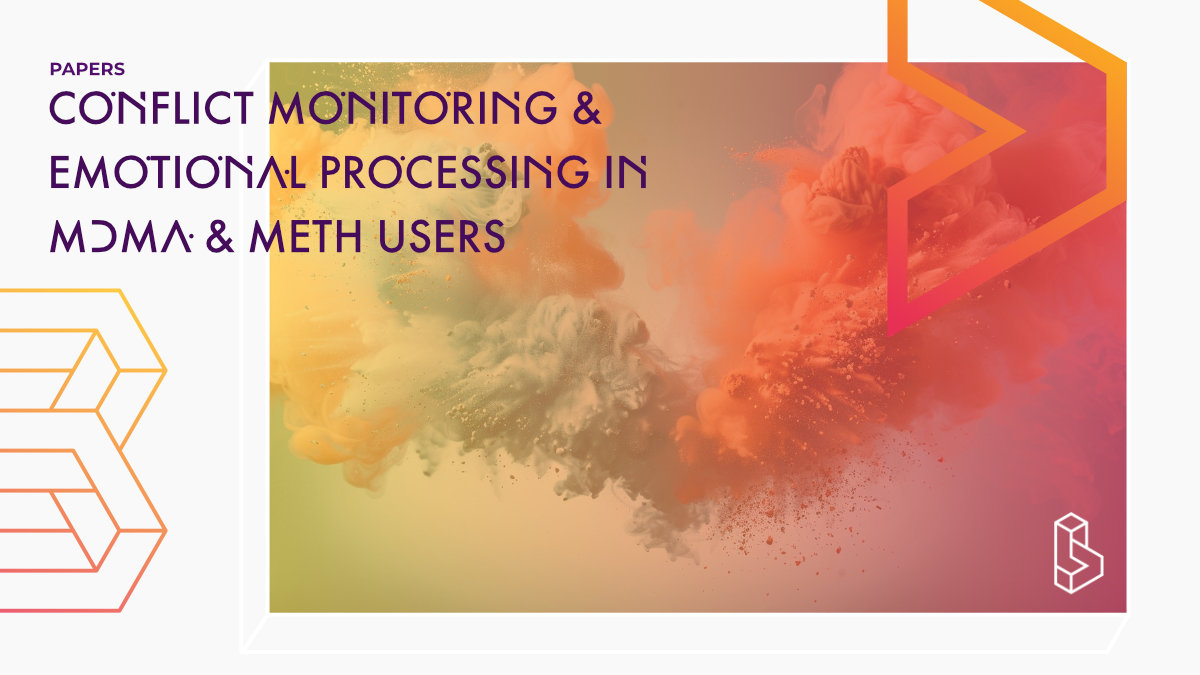This comparative study (n=42 MDMA, n=38 METH, n=83 controls) examines the impact of chronic METH (speed) and MDMA use on conflict control processes in social-affective contexts. Both METH and MDMA users exhibit reduced behavioural effects in cognitive-emotional conflict processing, particularly regarding anger content. These effects are associated with stronger P3 event-related potential modulations, suggesting altered decision-making and stimulus-response mapping, potentially linked to noradrenergic dysfunctions.
Abstract of Conflict monitoring and emotional processing in MDMA and methamphetamine users
“In stimulant use and addiction, conflict control processes are crucial for regulating substance use and sustaining abstinence, which can be particularly challenging in social-affective situations. Users of methamphetamine (METH, “Ice”) and 3,4-methylenedioxymethamphetamine (MDMA, “Ecstasy”) both experience impulse control deficits, but display different social-affective and addictive profiles. We thus aimed to compare the effects of chronic use of the substituted amphetamines METH and MDMA on conflict control processes in different social-affective contexts (i.e., anger and happiness) and investigate their underlying neurophysiological mechanisms. For this purpose, chronic but recently abstinent users of METH (n = 38) and MDMA (n = 42), as well as amphetamine-naïve healthy controls (n = 83) performed an emotional face-word Stroop paradigm, while event-related potentials (ERPs) were recorded. Instead of substance-specific differences, both MDMA and METH users showed smaller behavioral effects of cognitive-emotional conflict processing (independently of emotional valence) and selective deficits in emotional processing of anger content. Both effects were underpinned by stronger P3 ERP modulations suggesting that users of substituted amphetamines employ altered stimulus–response mapping and decision-making. Given that these processes are modulated by noradrenaline and that both MDMA and METH use may be associated with noradrenergic dysfunctions, the noradrenaline system may underlie the observed substance-related similarities. Better understanding the functional relevance of this currently still under-researched neurotransmitter and its functional changes in chronic users of substituted amphetamines is thus an important avenue for future research.”
Authors: Antje Opitz, Josua Zimmermann, David M. Cole, Rebecca C. Coray, Anna Zachäi, Markus R. Baumgartner, Andrea E. Steuer, Maximilian Pilhatsch, Boris B. Quednow, Christian Beste & Ann-Kathrin Stock
Summary of Conflict monitoring and emotional processing in MDMA and methamphetamine users
Introduction
Both MDMA and METH users experience impairments in executive functions, especially impulse control, which may affect how users interact with other individuals. However, the chronic effects of MDMA and METH on impulse control have rarely been investigated.
MDMA and METH target monoamine reuptake mechanisms, but MDMA has stronger effects on the serotonin system and METH has stronger effects on the dopamine system. Both substances differ in their addictive potential.
Find this paper
https://doi.org/10.1016/j.nicl.2024.103579
Open Access | Google Scholar | Backup | 🕊
Cite this paper (APA)
Opitz, A., Zimmermann, J., Cole, D. M., Coray, R. C., Zachäi, A., Baumgartner, M. R., ... & Stock, A. K. (2024). Conflict monitoring and emotional processing in 3, 4-methylenedioxymethamphetamine (MDMA) and methamphetamine users–a comparative neurophysiological study. NeuroImage: Clinical, 103579.
Study details
Compounds studied
MDMA
Topics studied
Neuroscience
Study characteristics
Observational
Bio/Neuro
Participants
163
Humans

